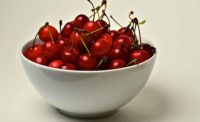Montmorency Tart Cherries: Homegrown Superfruit
Montmorency tart cherries bring many potential better-for-you benefits with clean label appeal

Thanks to years of scientific research, Montmorency tart cherries have broken out of the pie shell and onto the “superfruit” stage. This traditional pie ingredient has gained a new reputation and now is praised for its versatility, nutrient density and health benefits.
Although the name is associated with a valley in France, Montmorency tart cherries are strictly homegrown. Tart or sour cherries (Prunus cerasus) are grown primarily in seven U.S. states, including Michigan, Utah, Wisconsin, Washington, Oregon, Pennsylvania and New York. So when food and beverage companies purchase U.S. Montmorency tart cherries, they’re supporting American family farms, which is something consumers can feel good about.
Montmorency tart cherries are harvested in the summer—although they’re available year-round in multiple forms: dried, frozen, canned, 100% juice and juice concentrate. Food and beverage processors can use Montmorency tart cherries to add a pop of color, a nutrient punch and a hint of sweet-tart flavor to product applications, such as overnight oats, grain bowls, salads, side dishes, trail mixes, beverages and more.
Better-for-You Benefits
Nearly all the scientific research on cherries has been conducted on the Montmorency variety versus any other type of cherry. These studies on Montmorency tart cherries have focused on a range of topics, including arthritis and gout, cardiovascular health, exercise recovery and sleep.
Many of the studies have focused on the anthocyanins in tart cherries, a type of polyphenol in the flavonoids family. The distinctive taste and deep red color of Montmorency tart cherries are due to the concentration of anthocyanins.
Arthritis & Gout: Studies have explored the impact of Montmorency tart cherry juice consumption on gout attacks and arthritis symptoms.
Exercise Recovery: Research suggests Montmorency tart cherry juice may help aid exercise recovery. Montmorency tart cherry juice is rapidly gaining a following among elite athletes and recreational exercisers as a recovery drink. Positive results have been found with long-distance running, cycling, sprinting, field sports and strength training.
Sleep: Preliminary studies on Montmorency tart cherries, one of the few food sources of melatonin, have explored the duration and quality of sleep, insomnia and sleep efficiency. The research is still emerging and more studies are needed to confirm the role of tart cherries on achieving a better night’s sleep.
Heart Health: Studies on cardiovascular health are still emerging, with preliminary studies exploring tart cherries and the effect on blood pressure and blood lipids. A randomized, placebo-controlled, double-blind, crossover study of 15 men with early hypertension found that the participants who consumed tart cherry juice concentrate (60mL, or the equivalent of 180 tart cherries) experienced a reduction in systolic blood pressure, but not microvascular reactivity or arterial stiffness.
To source Montmorency tart cherries, please visit CherryProcessor.com.
Cherry Industry
Administrative Board
12800 Escanaba Drive,
Suite A, Dewitt, MI 48820
Email: info@cherryprocessor.com
Website: www.cherryprocessor.com
Looking for a reprint of this article?
From high-res PDFs to custom plaques, order your copy today!



